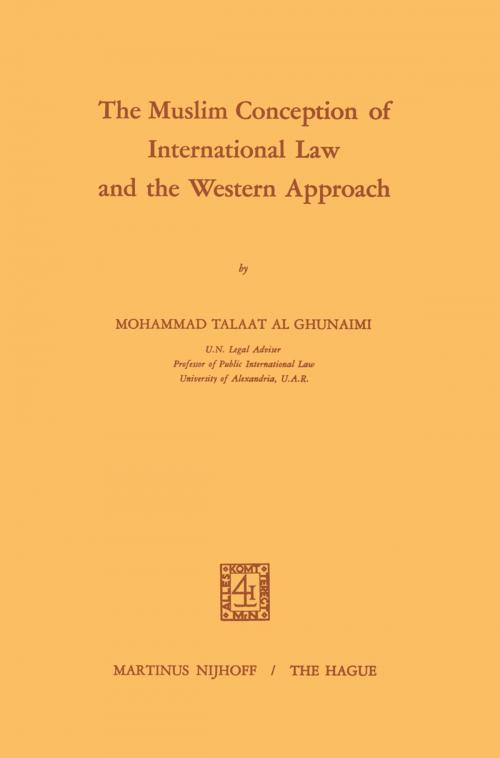The Muslim Conception of International Law and the Western Approach
Nonfiction, Reference & Language, Law, International| Author: | Mohammad Talaat Ghunaimi | ISBN: | 9789401195089 |
| Publisher: | Springer Netherlands | Publication: | December 6, 2012 |
| Imprint: | Springer | Language: | English |
| Author: | Mohammad Talaat Ghunaimi |
| ISBN: | 9789401195089 |
| Publisher: | Springer Netherlands |
| Publication: | December 6, 2012 |
| Imprint: | Springer |
| Language: | English |
The traditional doctrine of Islamic law in regard to international re lations is well known. The Shari'a includes many excellent provisions about declarations of war, treaties of peace, armistices, diplomatic envoys, negotiations and guarantees of safe conduct. But the fact remains that it divides the world, broadly speaking, into the "Abode of Islam" and the "Abode of 'War," and that it envisages the continu ance of intermittent war between them until the latter is absorbed in the former. In the course of such fighting, and in the intervals in be tween, many civilities were to be meticulously observed; but prisoners of war could be killed, sold or enslaved at the discretion of the Muslim authorities, and the women of those who resisted the advance of Islam could be taken as slave-concubines, regardless of whether they were single or married. The "Abode of Islam" did not, indeed, consist ex clusively of Muslims, for those whose religion was based on a book accepted by Islam as originally inspired and in practice, indeed, those other religions too - were not forced to embrace Islam but only to accept Muslim rule. They were granted the status of dhimmis, were protected in their persons and their property, were allowed to follow their own religion in an unobtrusive fashion, and were accorded the position of essentially second-class citizens. They were also of course, perfectly free to embrace Islam; but for a Muslim to be converted to another faith involved the death penalty.
The traditional doctrine of Islamic law in regard to international re lations is well known. The Shari'a includes many excellent provisions about declarations of war, treaties of peace, armistices, diplomatic envoys, negotiations and guarantees of safe conduct. But the fact remains that it divides the world, broadly speaking, into the "Abode of Islam" and the "Abode of 'War," and that it envisages the continu ance of intermittent war between them until the latter is absorbed in the former. In the course of such fighting, and in the intervals in be tween, many civilities were to be meticulously observed; but prisoners of war could be killed, sold or enslaved at the discretion of the Muslim authorities, and the women of those who resisted the advance of Islam could be taken as slave-concubines, regardless of whether they were single or married. The "Abode of Islam" did not, indeed, consist ex clusively of Muslims, for those whose religion was based on a book accepted by Islam as originally inspired and in practice, indeed, those other religions too - were not forced to embrace Islam but only to accept Muslim rule. They were granted the status of dhimmis, were protected in their persons and their property, were allowed to follow their own religion in an unobtrusive fashion, and were accorded the position of essentially second-class citizens. They were also of course, perfectly free to embrace Islam; but for a Muslim to be converted to another faith involved the death penalty.















